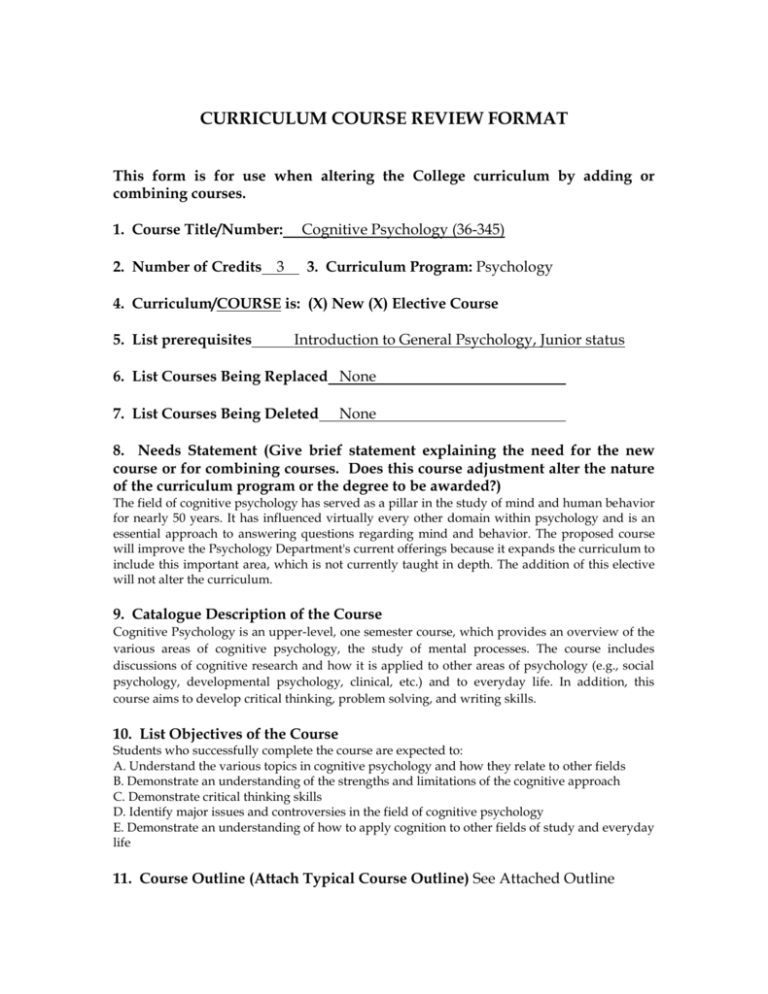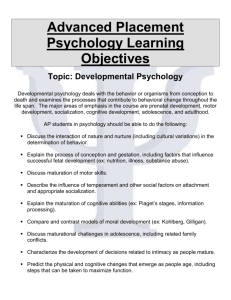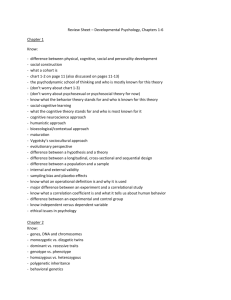
CURRICULUM COURSE REVIEW FORMAT
This form is for use when altering the College curriculum by adding or
combining courses.
1. Course Title/Number:
2. Number of Credits 3
Cognitive Psychology (36-345)
3. Curriculum Program: Psychology
4. Curriculum/COURSE is: (X) New (X) Elective Course
5. List prerequisites
Introduction to General Psychology, Junior status
6. List Courses Being Replaced None
7. List Courses Being Deleted
None
8. Needs Statement (Give brief statement explaining the need for the new
course or for combining courses. Does this course adjustment alter the nature
of the curriculum program or the degree to be awarded?)
The field of cognitive psychology has served as a pillar in the study of mind and human behavior
for nearly 50 years. It has influenced virtually every other domain within psychology and is an
essential approach to answering questions regarding mind and behavior. The proposed course
will improve the Psychology Department's current offerings because it expands the curriculum to
include this important area, which is not currently taught in depth. The addition of this elective
will not alter the curriculum.
9. Catalogue Description of the Course
Cognitive Psychology is an upper-level, one semester course, which provides an overview of the
various areas of cognitive psychology, the study of mental processes. The course includes
discussions of cognitive research and how it is applied to other areas of psychology (e.g., social
psychology, developmental psychology, clinical, etc.) and to everyday life. In addition, this
course aims to develop critical thinking, problem solving, and writing skills.
10. List Objectives of the Course
Students who successfully complete the course are expected to:
A. Understand the various topics in cognitive psychology and how they relate to other fields
B. Demonstrate an understanding of the strengths and limitations of the cognitive approach
C. Demonstrate critical thinking skills
D. Identify major issues and controversies in the field of cognitive psychology
E. Demonstrate an understanding of how to apply cognition to other fields of study and everyday
life
11. Course Outline (Attach Typical Course Outline) See Attached Outline
12. Show how the proposed course fits into the curriculum of course sequence.
Attach course descriptions and list course numbers. Students will enter 34-345 after
completing Introduction to General Psychology and after attaining Junior status.
13. Are there comparable courses in other departments?
comparable courses here.
If so, list all
There are no comparable courses.
14. How will students be affected by this course change? Will this course
improve students' professional competence, employability, and ability to pass
professional examinations? Does this course increase the number of credit
hours required for graduation? Do the course prerequisites increase the total
number of semester hours in this curriculum program?
Students will be positively affected by this course because they will now have the additional
option within the Psychology Curriculum. This course does not require any additional semester
hours within this curriculum program and requires only Introduction to General Psychology and
Junior status as prerequisites.
15. What effect will this new course have on College resources? Will this
course require new or additional resources and/or staffing?
This course has minimal impact with regard to resources; it will be taught on an annual basis by
existing faculty on a rotating basis.
16. How will this new course benefit the College?
This course adds the study of thought processes into the College of Humanities and Social
Sciences--something that every student can use.
17. How will the change affect the program?
This course will increase the choices of electives that each student has and will require no
additional instructors.
Submitted by:
Approved by the Faculty of Department (Date):
Date:
Delaware State University
Cognitive Psychology Course Syllabus
36-345 (3 credits)
The following is the common course syllabus for Cognitive Psychology.
Additional syllabi, agendas, outlines, schedules and assignments will be
provided by individual instructors.
Required Textbook: Ashcraft, M. H. (2006). Cognition (4th ed.). Upper Saddle
River, NJ: Pearson/Prentice Hall.
COURSE DESCRIPTION:
Cognitive Psychology is an upper-level, one semester course, which provides an
overview of the various areas of cognitive psychology, the study of mental
processes. The course includes discussions of cognitive research and how it is
applied to other areas of psychology (e.g., social psychology, developmental
psychology, clinical, etc.) and to everyday life. In addition, this course aims to
develop critical thinking, problem solving, and writing skills.
OVERVIEW OF COURSE CONTENT:
This course is designed to introduce the major concepts and principles in the
field of cognitive psychology, relate material to other fields of psychology, and to
discuss applications of cognition to human experience. This course covers the
following major topics: (1) History of Cognitive Psychology, (2) the Cognitive
Science Approach, (3) Perception, (4) Attention, (5) Short-Term Memory, (6)
Learning and Memory, (7) Knowledge and its Applications, (8) Language, (9)
Judgment, Reasoning, and Decision Making, and (10) Problem Solving.
COMMON LEARNING OBJECTIVES:
It is expected that students who successfully complete this course will be able to:
Understand the various topics in cognitive psychology and how they relate
to other fields
Demonstrate an understanding of the strengths and limitations of the
cognitive approach
Demonstrate critical thinking skills
Identify major issues and controversies within the field of cognitive
psychology
Demonstrate an understanding of how to apply cognition to other fields of
study and everyday life
MODELS OF INSTRUCTION:
This course will use lectures, open discussion, and collaborative group and/or
individual activities. Additional instructional models may include PowerPoint,
Visual Aids using overhead projectors, laboratory experiences, simulation
activities, teacher-student discussions, scientific inquiry, and research methods.
METHOD OF EVALUATION:
Exams:
55-75%
Assignments
0-25%
Other Evaluation
0-20%
Extra credit may be given in some sections
Grades will be averaged and a course grade assigned based on the instructor’s
required assignments and specified percentage categories. The University
grading scale will be used across all course sections: A = 90-100%, B = 80-89%, C =
70-79%, D = 60-69%, F = less than 60%.
ATTENDANCE:
Regular class attendance is expected and beneficial. At the instructor’s discretion,
attendance may be required and included in the final grade calculation.
SPECIAL ACCOMMODATIONS:
If there is any student in this class who is in need of academic accommodations
and who is registered with the Office of Disabilities Services, please make an
individual appointment with the course instructor to discuss accommodations.
Upon individual request, this syllabus can be made available in alternate forms.
If any student who is not registered with the Office of Disabilities Services has
need of academic accommodations, please contact Laura Kurtz, Director of
Disabilities Services by phone at 857-6388/6385.
COURSE OUTLINE:
Week 1: Introduction to Cognitive Psychology
Readings: Ashcraft, Chapter 1
Weeks 2-3: Cognitive Science
Readings: Ashcraft, Chapter 2
Week 4: Perception
Readings: Ashcraft, Chapter 3
Week 5: Attention
Readings: Ashcraft, Chapter 4
Week 6: Short-Term Working Memory
Readings: Ashcraft, Chapter 5
Week 7: Learning & Memory
Readings, Ashcraft, Chapter 6
Weeks 8-9: Knowledge
Readings, Ashcraft, Chapter 7
Week 10: Knowledge Applications
Readings, Ashcraft, Chapter 8
Week 11: Language
Readings, Ashcraft, Chapter 9
Week 12: Reading and Listening
Readings, Ashcraft, Chapter 10
Weeks 13-14: Judgment, Decision Making, and Reasoning
Readings, Ashcraft, Chapter 11
Week 15: Problem Solving
Readings, Ashcraft, Chapter 12







